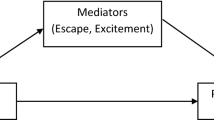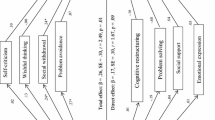Abstract
Understanding the variables that contribute to the comorbidity of depression and gambling behaviors is important in developing effective intervention strategies for those who experience gambling-related problems. The purpose of this study was to implement core concepts from Jacob’s general theory of addiction and the social cognitive theory in a multiple mediation model. Specifically, we tested two models to examine whether coping motivation and refusal self-efficacy mediated the relationship between depressive symptoms, gambling related problems, and days gambled. Data was collected from 333 undergraduate students at a large public Midwest university, participating in a larger clinical trial. Analyses indicated a direct effect between depressive symptoms and gambling related problems. Depressive symptoms were found to have a significant indirect effect through coping motivation and gambling refusal self-efficacy on gambling related problems and days gambled. These results provide further support regarding the mechanisms through which depressive symptoms may increase risk for problematic gambling behavior.


Similar content being viewed by others
References
Arroll, B., Khin, N., & Kerse, N. (2003). Screening for depression in primary care with two verbally asked questions: Cross sectional study. BMJ. doi:10.1136/bmj.327.7424.1144.
Bandura, A. (1991). Social cognitive theory of self-regulation. Organizational Behavior and Human Decision Processes. doi:10.1016/0749-5978(91)90022-L.
Bandura, A. (1997). Self-efficacy: The exercise of control. New York: Freeman.
Bandura, A. (1999). A sociocognitive analysis of substance abuse: An agentic perspective. Psychological Science. doi:10.1111/1467-9280.00138.
Blaszczynski, A., & Nower, L. (2002). A pathways model of problem and pathological gambling. Addiction. doi:10.1046/j.1360-0443.2002.00015.x.
Blinn-Pike, L., Worthy, S. L., & Jonkman, J. N. (2007). Disordered gambling among college students: A meta-analytic synthesis. Journal of Gambling Studies. doi:10.1007/s10899-006-9036-2.
Burling, T. A., Reilly, P. M., Moltzen, J. O., & Ziff, D. C. (1989). Self-efficacy and relapse among inpatient drug and alcohol abusers: A predictor of outcome. Journal of Studies on Alcohol and Drugs, 50(4), 354–360.
Carey, K. B., Carey, M. P., Maisto, S. A., & Henson, J. M. (2008). Brief motivational interventions for heavy college drinkers: A randomized controlled trail. Journal of Consulting and Clinical Psychology. doi:10.1037/0022-006X.74.5.943.
Carney, M. A., Tennen, H., Affleck, G., Del Boca, F. K., & Kranzler, H. R. (1998). Levels and patterns of alcohol consumption using timeline follow-back, daily diaries, and real-time “electronic interviews”. Journal of Studies on Alcohol, 59(4), 447–454.
Casey, L. M., Oei, T. P. S., Melville, K. M., Bourke, E., & Newcombe, P. A. (2008). Measuring self-efficacy in gambling: The gambling refusal self-efficacy questionnaire. Journal of Gambling Studies. doi:10.1007/s10899-007-9076-2.
Clarke, D. (2006). Impulsivity as a mediator in the relationship between depression and problem gambling. Personality and Individual Differences. doi:10.1016/j.paid.2005.05.008.
Del Boca, F. K., & Darkes, J. (2002). The validity of self-reports of alcohol consumption: State of the science and challenges for research. Addiction. doi:10.1046/j.1359-6357.2003.00586.x.
Ferris, J., & Wynne, H. (2001). The Canadian problem gambling index. Ottawa, ON: Canadian Centre on Substance Abuse. Retrieved from http://www.ccsa.ca/pdf/ccsa-009381-2001.pdf.
Gebauer, L., LaBrie, R., & Shaffer, H. J. (2010). Optimizing DSM-IV-TR classification accuracy: A brief biosocial screen for detecting current gambling disorders among gamblers in the general household population. Canadian Journal of Psychiatry, 55(2), 82–90.
Getty, H. A., Watson, J., & Frisch, G. R. (2000). A comparison of depression and styles of coping in male and female GA members and controls. Journal of Gambling Studies. doi:10.1023/A:1009480106531.
Gupta, R., & Derevensky, J. L. (1998). An empirical examination of Jacobs’ general theory of addictions: Do adolescent gamblers fit the theory? Journal of Gambling Studies. doi:10.023/A:1023046509031.
Haw, J. (2009). Impulsivity partially mediates the relationship between depression and problem gambling. Gambling Research, 21(2), 12.
Hayes, A. F. (2012). PROCESS: A versatile computational tool for observed variable mediation, moderation, and conditional process modeling [White paper]. Retrieved from http://www.afhayes.com/public/process2012.pdf.
Henkel, V., Mergl, R., Coyne, J. C., Kohnen, R., Möller, H. J., & Hegerl, U. (2004). Screening for depression in primary care: Will one or two items suffice? European Archives of Psychiatry and Clinical Neuroscience. doi:10.1007/s00406-004-0476-3.
Hustey, F. M. (2005). The use of a brief depression screen in older emergency department patients. Academic Emergency Medicine. doi:10.1197/j.aem.2005.04.009.
Jacobs, D. F. (1986). A general theory of addictions: A new theoretical model. Journal of Gambling Behavior. doi:10.1007/BF01019931.
Kadden, R. M., & Litt, M. D. (2011). The role of self-efficacy in the treatment of substance use disorders. Addictive Behaviors. doi:10.1016/j.addbeh.2011.07.032.
Kaur, I., Schutte, N. S., & Thorsteinsson, E. B. (2006). Gambling control self-efficacy as a mediator of the effects of low emotional intelligence on problem gambling. Journal of Gambling Studies. doi:10.1007/s10899-006-9029-1.
Kessler, R. C., Hwang, I., LaBrie, R., Petukhova, M., Sampson, N. A., Winters, K. C., & Shaffer, H. J. (2008). DSM-IV pathological gambling in the National Comorbidity Survey Replication. Psychological Medicine. doi:10.1017/S0033291708002900.
LaBrie, R. A., Shaffer, H. J., LaPlante, D. A., & Wechsler, H. (2003). Correlates of college student gambling in the United States. Journal of American College Health. doi:10.1080/07448480309595725.
Lesieur, H. R. (1998). Costs and treatment of pathological gambling. The Annals of the American Academy of Political and Social Science. doi:10.1177/0002716298556001012.
Lesieur, H. R., & Blume, S. B. (1987). The South Oaks Gambling Screen (SOGS): A new instrument for the identification of pathological gamblers. American Journal of Psychiatry, 144(9), 1184–1188.
Lloyd, J., Doll, H., Hawton, K., Dutton, W. H., Geddes, J. R., Goodwin, G. M., & Rogers, R. D. (2010). How psychological symptoms relate to different motivations for gambling: An online study of internet gamblers. Biological Psychiatry. doi:10.1016/j.biopsych.2010.03.038.
Martens, M. P., Arterberry, B. J., Takamatsu, S. K., Masters, J., & Dude, K. (2015). The efficacy of a personalized feedback-only intervention for at-risk college gamblers. Journal of Consulting and Clinical Psychology. doi:10.1037/a0038843.
Martens, M. P., & Haase, R. H. (2006). Advanced applications of structural equation modeling in counseling psychology research. The Counseling Psychologist. doi:10.1177/0011000005283395.
Martens, M. P., Martin, J. L., Hatchett, E. S., Fowler, R. M., Fleming, K., Karakashian, M. A., & Cimini, M. D. (2008). Protective behavioral strategies and the relationship between depressive symptoms and alcohol-related negative consequences among college students. Journal of Counseling Psychology. doi:10.1037/a0013588.
Martin, R. J., Usdan, S., Cremeens, J., & Vail-Smith, K. (2014). Disordered gambling and co-morbidity of psychiatric disorders among college students: An examination of problem drinking, anxiety and depression. Journal of Gambling Studies. doi:10.1007/s10899-013-9367-8.
May, R. K., Whelan, J. P., Steenbergh, T. A., & Meyers, A. W. (2003). The gambling self-efficacy questionnaire: An initial psychometric evaluation. Journal of Gambling Studies. doi:10.1023/A:1026379125116.
McManus, D., Pipkin, S. S., & Whooley, M. A. (2005). Screening for depression in patients with coronary heart disease (data from the Heart and Soul Study). The American Journal of Cardiology, 96(8), 1076–1081.
Mohr, D. C., Hart, S. L., Julian, L., & Tasch, E. S. (2007). Screening for depression among patients with multiple sclerosis: Two questions may be enough. Multiple Sclerosis. doi:10.1177/1352458506070926.
Nowak, D. E., & Aloe, A. M. (2013). The prevalence of pathological gambling among college students: A meta-analytic synthesis, 2005–2013. Journal of Gambling Studies. doi:10.1007/s10899-013-9399-0.
Petry, N. M., Stinson, F. S., & Grant, B. F. (2005). Comorbidity of DSM-IV pathological gambling and other psychiatric disorders: Results from the national epidemiologic survey on alcohol and related conditions. Journal of Clinical Psychiatry. doi:10.4088/JCP.v66n0504.
Raylu, N., & Oei, T. P. S. (2002). Pathological gambling: A comprehensive review. Clinical Psychology Review. doi:10.1016/S0272-7358(02)00101-0.
Rucker, D. D., Preacher, K. J., Tormala, Z. L., & Petty, R. E. (2011). Mediation analysis in social psychology: Current practices and new recommendations. Social and Personality Psychology Compass. doi:10.1111/j.1751-9004.2011.00355.x.
Schaus, J. F., Sole, M. L., McCoy, T. P., Mullett, N., & O’Brien, M. C. (2009). Alcohol screening and brief intervention in a college student health center: A randomized controlled trial. Journal of Studies on Alcohol and Drugs, 16, 131–141.
Shaffer, H. J., Hall, M. N., & Bilt, J. V. (1999). Estimating the prevalence of disordered gambling behavior in the United States and Canada: A research synthesis. American Journal of Public Health. doi:10.2105/AJPH.89.9.1369.
Shead, N. W., & Hodgins, D. C. (2009). Affect-regulation expectancies among gamblers. Journal of Gambling Studies. doi:10.1007/s10899-009-9131-2.
Stewart, S. H., & Zack, M. (2008). Development and psychometric evaluation of a three-dimensional Gambling Motives Questionnaire. Addiction. doi:10.1111/j.1360-0443.2008.02235.x.
Sylvain, C., Ladouceur, R., & Boisvert, J. (1997). Cognitive and behavioral treatment of pathological gambling: A controlled study. Journal of Consulting and Clinical Psychology. doi:10.1037/0022-006X.65.5.727.
Tang, C. S. K., & Oei, T. P. (2011). Gambling cognition and subjective well-being as mediators between perceived stress and problem gambling: A cross-cultural study on White and Chinese problem gamblers. Psychology of Addictive Behaviors. doi:10.1037/a0024013.
Tang, C. S. K., & Wu, A. M. (2010). Direct and indirect influences of fate control belief, gambling expectancy bias, and self-efficacy on problem gambling and negative mood among Chinese college students: A multiple mediation analysis. Journal of Gambling Studies. doi:10.1007/s10899-010-9177-1.
Thomsen, R. K., Callesen, M. B., Linnet, J., Kringelbach, M. L., & Moller, A. (2009). Severity of gambling is associated with severity of depressive symptoms in pathological gamblers. Behavioural Pharmacology. doi:10.1097/FBP.0b013e3283305e7a.
Weinstock, J., Whelan, J. P., & Meyers, A. W. (2004). Behavioral assessment of gambling: An application of the timeline followback method. Psychological Assessment. doi:10.1037/1040-3590.16.1.72.
Whooley, M. A., Avins, A. L., Miranda, J., & Browner, W. S. (1997). Case-finding instruments for depression: Two questions are as good as many. Journal of General Internal Medicine. doi:10.1046/j.1525-1497.1997.00076.x.
Williams, A. D., Grisham, J. R., Erskine, A., & Cassedy, E. (2012). Deficits in emotion regulation associated with pathological gambling. British Journal of Clinical Psychology. doi:10.1111/j.2044-8260.2011.02022.x.
Wood, R. T. A., & Griffiths, M. D. (2007). A qualitative investigation of problem gambling as an escape-based coping strategy. Psychology and Psychotherapy: Theory, Research and Practice. doi:10.1348/147608306X107881.
Yi, S. (2012). Shame-prone gamblers and their coping with gambling loss. Journal of Gambling Issues. doi:10.4309/jgi.2012.27.7.
Yi, S., & Kanetkar, V. (2011). Coping with guilt and shame after gambling loss. Journal of Gambling Studies. doi:10.1007/s10899-010-9216-y.
Acknowledgments
This project was supported by a Grant from the National Center for Responsible Gaming.
Author information
Authors and Affiliations
Corresponding author
Ethics declarations
This project was approved by the university Institutional Review Board and has therefore been performed in accordance with the ethical standards laid down in the 1964 Declaration of Helsinki and its later amendments or comparable ethical standards. All persons gave their informed consent prior to their inclusion in the study.
Rights and permissions
About this article
Cite this article
Takamatsu, S.K., Martens, M.P. & Arterberry, B.J. Depressive Symptoms and Gambling Behavior: Mediating Role of Coping Motivation and Gambling Refusal Self-Efficacy. J Gambl Stud 32, 535–546 (2016). https://doi.org/10.1007/s10899-015-9562-x
Published:
Issue Date:
DOI: https://doi.org/10.1007/s10899-015-9562-x




